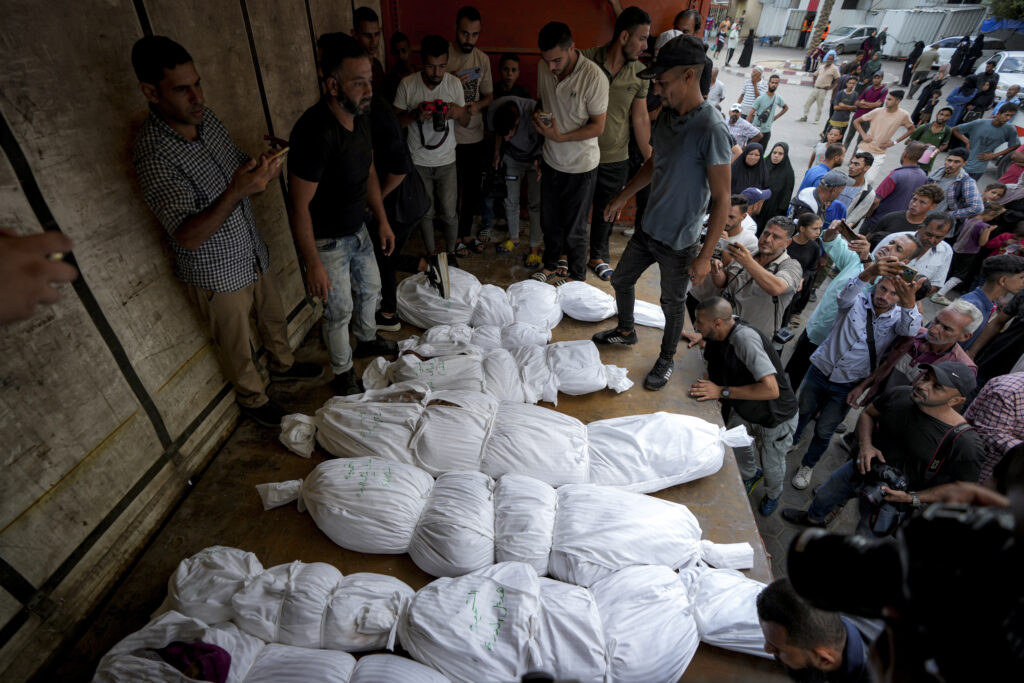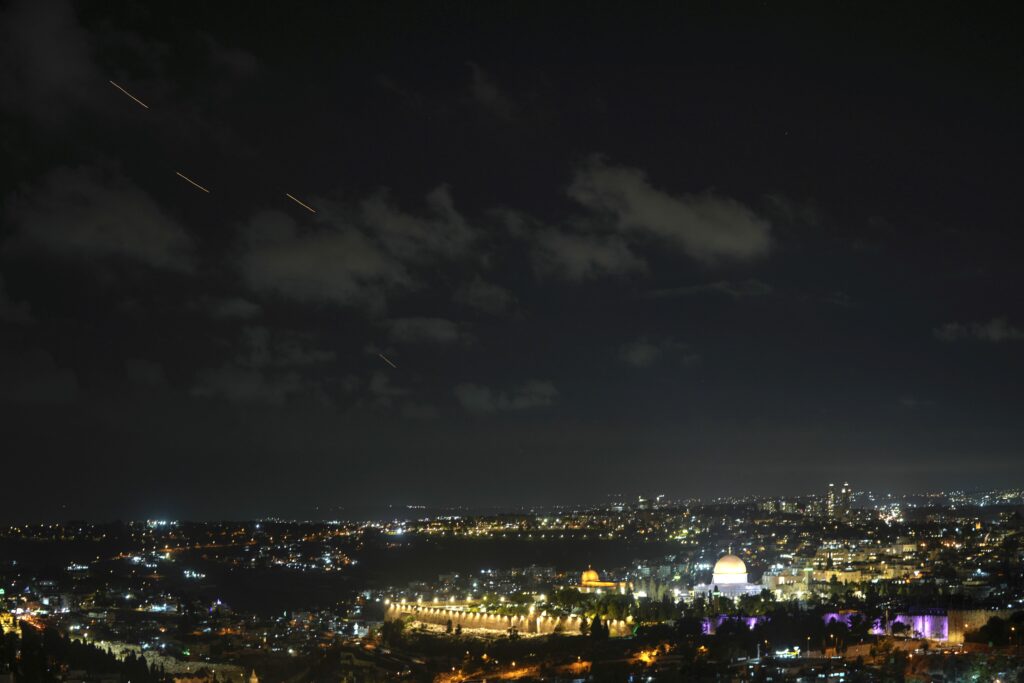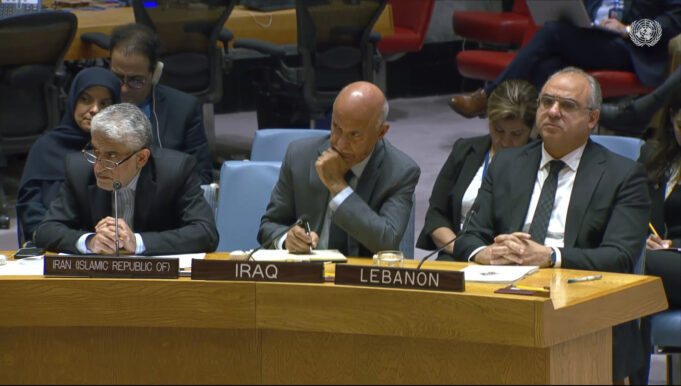Hostilities in the Middle East recently grew hotter when the Islamic Republic of Iran unleashed 200 long-range missiles into the Zionist state of Israel. Alert sirens filled the night sky of Tel Aviv, forcing people across Israel and the occupied Palestinian territory to seek shelter.
Iran said the bombardment was a “legal,” “rational,” and “legitimate” response to “terrorist acts of the Zionist regime” which targeted Iranian nationals, interests, and sovereignty.
The attack was in response to Israel’s killing of Hezbollah leader Hassan Nasrallah and Abbas Nilforoushan, a deputy commander of Iran’s Revolutionary Guards, in Lebanon on Sept. 27, and Hamas political leader, Ismail Haniyeh in Tehran in July. Some saw the strike as understandable after months of Iran’s restraint in the face of Israel’s unchecked aggression.
“With every level of Israeli adventurism that’s met without a response creates a higher willingness of Israel to strike deeper and harder,” said Muhammad Sankari, spokesman for the U.S. Palestinian Community Network (USPCN)-Chicago.
“And so when you’re dealing with a state like that, it is understandable that people would want to respond in kind,” he said. Mr. Sankari sees the escalation as a result of Israel’s unwillingness to negotiate a ceasefire and leaving only two paths: ending the genocide or regional war.
“I think that’s where we’re headed,” he said, and added, “We’re at this fork in the road, and there are two paths ahead of us.”
Mr. Sankari pointed out that the worsening developments highlight another level of warfare. War with Houthis, Hamas, and Hezbollah—though formidable, is different from a direct military exchange with Iran.
“This is definitely another layer of escalation,” said Mr. Sankari. Engaging in warfare with a paramilitary force like Hezbollah is one thing, but a direct exchange of fire with Iran, a formal military is another thing, he said. “It’s inched us closer to this explosion of regional war, and possibly worse, that everyone has been sounding the alarms around,” explained Mr. Sankari.
“We should be very clear that the reason that we’re on the brink of regional war, and possibly even bigger than just regional war, is for one reason alone,” he continued, “Israel does not want to end their genocidal war against the Palestinian people.”
Is it too late for diplomacy?
The move marked another dangerous twist to Israel’s yearlong war in Gaza, and expanded to Lebanon, which started October 7, 2023. Tens of thousands of mostly innocent people were slain, injured, and displaced.
At presstime, the death toll in Gaza stood at 41,788 and counting, according to several media outlets. With tensions so dangerously high, questions loom if it is too late for diplomacy.
“I would say, it’s never too late for diplomacy,” said Phyllis Bennis, the director of the New Internationalism Project at the Institute For Policy Studies. “The worse things get, the more desperate the need for solid diplomatic pressure to stop the fighting,” she reasoned.
Ms. Bennis told The Final Call that the problem since the beginning of this round of Israeli violence is the refusal of the United States, its chief backer, to leverage its influence of vast financial and military aid to Israel.
The Biden administration has consistently called for a ceasefire. However, its actions contradict the words because America keeps providing the weapons that enable the war.
“So, that’s the challenge,” said Ms. Bennis. “It’s not whether or not diplomacy could work. It’s what will it take to change the U.S. position so that they use their actual influence that they do have with Israel to make diplomacy the name of the game,” she reasoned. “So far, they have not been willing to do that,” she added.

Warmongering
Israel’s warmongering relies on U.S. military support and political backing. American weapons constitute the major part of Israeli war ware, therefore making the U.S. complicit in every aspect of Israel’s atrocity, observers and analysts point out.
If there is minimal honesty to America’s talk about “diplomatic solutions” and concern for innocent life, it can simply deny Israel the tools being used in the atrocities, now in the tens of thousands.
Nearly 100 health volunteers who have volunteered in Gaza sent an open letter, dated October 2, to President Joe Biden and Vice President Kamala Harris pleading for a ceasefire. The letter, obtained by HuffPost was from American physicians, surgeons, nurse practitioners, nurses, and midwives who have volunteered in the Gaza Strip since October 7, 2023, at hospitals and clinics.
“A ceasefire must be imposed on the warring parties by withholding military support for Israel and supporting an international arms embargo on Israel and all Palestinian armed groups. We believe our government is obligated to do this, both under American law and International Humanitarian Law. We also believe it is the right thing to do,” the letter said in part.
“We urge you to realize that epidemics are raging in Gaza. Israel’s continued, repeated displacement of the malnourished and sick population of Gaza, half of whom are children, to areas without running water or even toilets available is absolutely shocking,” the letter continued.
“President Biden and Vice President Harris, we wish you could see the nightmares that plague so many of us since we have returned: dreams of children maimed and mutilated by our weapons, and their inconsolable mothers begging us to save them.
We wish you could hear the cries and screams our consciences will not let us forget. We cannot fathom why you continue arming the country that is deliberately killing these children en masse.”
Despite the disproportionate carnage from U.S.-provided weapons, Washington has committed more instruments of destruction and war to Israel. Such “ironclad” support highlights U.S. hypocrisy, say critics.
In one breath, she advocates a “diplomatic solution” and in the next breath, grants an $8.7 billion aid package to support Israel’s war efforts and qualitative military edge in the region.
Israel’s defense ministry announced the package on Sept. 26—which includes $3.5 billion it already received for wartime procurement and purchases, as well as $5.2 billion designated for air defense systems, including the Iron Dome anti-missile system, David’s Sling and an advanced laser system, reported Reuters.
Notwithstanding, America has consistently said it would defend Israel and maintains a heavy military footprint in the region.
Militarily, the U.S. has 40,000 troops across the Middle East, and on Oct. 1 announced the arrival of more fighting power. On its X page, the U.S. Central Command (CENTCOM) announced that three additional squadrons of F-15Es, F-16s, and A-10s have already arrived in the region.

Crisis has reached a dangerous crossroads
Rhetoric and chest-bumping have become more intense, thickening the atmosphere for all-out war rather than diplomacy, which can draw in America and various nations.
In a televised address from Tehran on Oct. 2, Iran’s Supreme Leader Ayatollah Ali Khamenei said hostilities would end if America and European countries left the region.
“If they get themselves out of this region, beyond a shadow of doubt, these conflicts … wars … clashes will come to a complete halt,” said Mr. Khamenei, in translated remarks.
Meanwhile, President Biden announced more sanctions on Iran. In addition, the Group of Seven (G7) nations, consisting of Canada, France, Germany, Italy, Japan, the United Kingdom and the United States issued a joint statement of condemnation of Iran and unequivocal support of Israel.
“A dangerous cycle of attacks and retaliation risks fueling uncontrollable escalation in the Middle East, which is in no one’s interest,” the statement read in part. “Therefore, we call on all regional players to act responsibly and with restraint.”
Iran’s Foreign Ministry rejected the statement as disingenuous, noting the culpability of the G7 countries in creating the crisis because of their financial and military support of Israel.
“We believe that if European states had taken effective and practical measures on time, including cutting off financial and weapons support, they would have cut short the killing and genocidal machine of the Zionist regime (Israel) by today and we would not have witnessed such tragedies,” the ministry said, reported Reuters.
Many people in Iran and on some Arab streets celebrated Iran’s move with placards and pictures of Mr. Nasrallah and Iranian flags. Others condemned it as a significant escalation.
During an Oct. 2 emergency meeting of the UN Security Council on the Middle East, Secretary-General Antonio Guterres said it is high time to stop the sickening cycle of escalations that is leading the people of the Middle East straight over the cliff.
“Each escalation has served as a pretext for the next,” he told the diplomats. “This deadly cycle of tit-for-tat violence must stop,” said Mr. Guterres.

Triggering multinational war
Warnings about the consequences of a multinational war resulting from increased animosity and hostilities have been given over the years by the Most Honorable Elijah Muhammad and his National Representative, the Honorable Minister Louis Farrakhan.
As Divine Warners to America and the world, both men spoke on and warned of the prophesied War of Armageddon. Observers and analysts have blamed a history of meddling by America and Israel as trouble sources of regional enmity.
For years, Washington and Tel Aviv have sought for Arab nations to join them in an anti-Tehran coalition. In his prophetic book, “Message to the Blackman in America,” the Most Honorable Elijah Muhammad warned to “Beware of False Promises” from mischief-makers.
“The war in the Middle East will get very, very bloody,” said Minister Farrakhan, on February 25 of this year in his Saviours’ Day message titled, “What Does Allah The Great Mahdi And The Great Messiah Have To Say About The War In The Middle East?”
The Minister has long cautioned America not to get entangled in a war with Iran at the instigation of Israel. Minister Farrakhan warned that Israel and America would lose in the Middle East and pay a price for their actions and violations.
“What I gave is prophecy that you can find in the Bible and the Qur’an that Israel is not going to stay; America is not going to stay in the Middle East, and when that war triggers all of the countries that it will trigger, the war of Armageddon will be all over the earth,” said the Minister.
“China will be involved. Russia will be involved. Kim Jong Un of North Korea will be involved, and there’ll be no hiding place for anyone,” said Minister Farrakhan.













